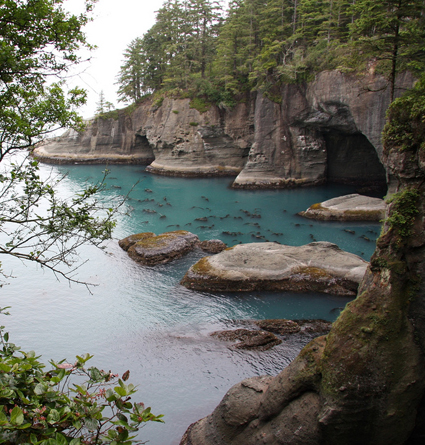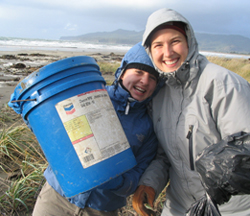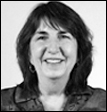Innovative Teaching Showcase
Portfolio
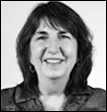
Overview
"We shall not cease from exploration and the end of all our exploring will be to arrive where we started and know the place for the first time." –T.S. Eliot, Four Quartets
This year's Showcase was designated to honor faculty who "aspire to address inclusion, diversity and difference in their courses." It is an honor to be recognized among those aspiring to this mission. I believe that those of us teaching in a human service discipline have the opportunity to put these efforts at the heart of our work. It is powerful to hear a student speak of a class experience as transformational, causing a shift in the way they view the world and their potential to impact it. Whether you use tolerance or another term to describe this shift, it is this impact, this outcome that I believe holds the most value in the work that I do.
I have to admit that I grappled with the term tolerance in the preparation of this portfolio, but it was a struggle worth having. Definitions of tolerance often include words like endure or allow, implying that it means to "put up with" something or someone. The term falls short of describing this transformation or shift that I have witnessed in students. After some interesting conversations with faculty in my program, it seems that tolerance is better placed as one of a number of steps to achieving something on higher ground; something closer to reverence.
These Recreation Program faculty conversations led us to imagine a series of stages in the development of reverence, all worthy targets in their own right. These progressive stages might include acknowledgement, tolerance, appreciation, reciprocity, respect, and reverence. There are other equally reflective terms, but the bottom line is that the ultimate goal is something bigger than, more impactful than, toleration. I know that I aspire for something beyond tolerance, hoping that students will be positioned to empower, enhance and elaborate the lives of others. To stop with the idea of tolerance would unnecessarily limit the potential of what we do in preparing students to be agents for change.
A subsequent challenge is describing this shift. Students struggle to find the words to describe their experiences. As a student in one of my classes describes it:
I had come out a better and stronger individual and the best part was, I didn't even notice it was happening...the feeling was indescribable.
Attempts at explaining their experiences often wield powerful descriptions. One student* in our program found these words:
I looked into his eyes while he was speaking and saw my brother, my sister, and my friends. My ill presumptions quickly dissipated and a true respect and yes, love, grew like an ember being blown by the wind on a dying flame. I pulled him towards the dance floor and danced several dances with him. I honestly have never enjoyed dancing as much as I did at that moment. I hugged his armless body with confidence, respect, and love. What a gift this was. I faced a gross injustice that burrowed in some dormant space, a prejudice camouflaged as acceptance in my heart. I am so humbled.
*This reflection was in response to participating in an overnight camp with teens and adults who have developmental disabilities.
I have found that other educators struggle to describe this powerful shift. Rud and Garrison1 have had some success, stating:
Students reflections often described an organic process and a resulting transformation... They were a convergence of action, thought and unavoidable emotion...their hearts, their heads struggled in response to experience/action but the results was a powerful shift...something that wasn't a 'thing' that they heard or thought, but something that lived in them...something that they would carry with them...something that shifted their world view...an awe for the power of discovering something they didn't know that they didn't know.
In one of the courses I teach, Recreation 385: Leisure and Aging, students are partnered with an older adult for independent, weekly conversations and activities surrounding course topics. Over the quarter they are also asked to explore and share the role of leisure over the course of their lives. Although they often fumble finding the right words, student reflections, especially at a closing group celebration, speak to great reverence for their partner. To revere, according to Webster Dictionary, is to "regard as worthy of great honor." Students and their older adult partner are given opportunities to honor each other and to articulate the worth of their relationship and the process of sharing their lives and thoughts.
One of Jill Heckathorn's students sharing her project with her older adult partner.
Paul Woodruff gives a definition of reverence that works well in the context of this discussion: "the capacity for a range of feelings and emotions that are linked. It is a sense that there is something larger than a human being, accompanied by capacities for awe, respect, and shame; it is often expressed in, and reinforced by ceremony."2 Well selected and designed course activities can provide ceremony or celebration that reinforces the development of reverence.
Students and campers participating in Camp TEAM share many bonding moments.
The question of how this best happens continues to challenge me. I have been teaching in the Recreation Program at Western since 1980, and have witnessed some extraordinary, almost magical, moments as students discover how their beliefs and behaviors have the potential to limit or enrich the lives of others. I have read student accounts of life-changing experiences as a result of course activities that connect them with diverse people and cultures. I have heard students speak of the impact of interactive fieldtrips that, in their words, were transformational. These reports have both humbled and inspired me as a teacher. They have undoubtedly been the fuel that drives me to include some type of experiential component in many classes I teach. I have explored and experimented with the qualities of course activities that matter, that allow for ceremony and celebration. What I have discovered is that there is no absolute formula. Just when I think I have it nailed, the individuals change and so does the experience. I have, although, identified a few essential qualities.
Experiential learning seems to be at the heart of teaching for reverence. In planning for experiences, I recognize that what we don't do (restraint) in our program and in our classes is as significant to this end as what we do (action). Students in our program are involved in quarterly off-campus retreats, 240 hours of fieldwork, a 15-credit professional internship, as well as numerous community-based course projects that provide potential for connecting with others. A safe, structured and supportive space is expansive and allows for individual variation in student experiences. An overly-managed or tightly-directed experience can be constrictive and unduly limit learning. In the Reverent Educator Newsletter, Rud and Garrison1 suggest the qualities of a learning experience that lead to a good balance of control and freedom:
Education should act to expand, it should be expansive. Too may directives, the wrong prompts, excessive rubric criteria, acts to contain, constrain, and discourage self-directed thought, self-discovery, and a sense of ownership, true belief.
In the first year of the Leisure and Aging partnership project I provided weekly questions for discussion and a detailed template for the development of their final project. It only took two weeks to realize that I was over-directing both the discussions and the projects. The individual nature of the experience was lost in the structure of the assignment; students and their older adult partners were asking for a more organic process. Students now develop their own individual discussion questions each week and propose a project that they feel best honors the unique life of their partner. Weekly class time is provided to share experiences and receive peer support.
Where the experiential aspect of class is critical, it
does not stand alone. Making it part of an integrated
curriculum is pivotal to creating a shift toward
reverence.
Experience as Teacher: Including the Head, Hands and Heart in Learning
Rudolph Steiner, a German philosopher, is noteworthy for many things including his work on how children learn. The translation of Steiner's work (Anthroposophy) into educational practice can be witnessed at Waldorf Schools around the world. At the core of Waldorf teaching is the belief that at its best, education includes the head or intellect, the heart or feeling, and the hands or will. David Kolb3 ascribes to a similar formula when he describes the essential qualities of the learning process for all ages: "watching, thinking (mind), feeling (emotion), and doing (muscle.)" A student in our program reflected on these same qualities:
The feelings I experienced are something that can't be laid out like a set of paints, it had to be created and lived through, and by my choice alone. My technical wisdom is great for class discussions, being politically correct and tests, but nothing can prepare you for Camp TEAM like Camp TEAM itself. Are my inhibitions, fears and anxiety wiped away? Not even close, but I now see that my heart is big enough to do my best and help everyone recreate no matter their capabilities.
Another student addressed the need for an integrated curriculum:
From Camp TEAM I learned that the simple experience of 24 hours with people with disabilities can ignite enormous compassion and eliminate ignorance and prejudice. I also realized that reading about it, watching videos about it, and being lectured about it are not quite enough—it truly required the experience to seal the deal.
I teach a senior-level course on ecotourism which includes a three-day fieldtrip to Neah Bay. During the trip, we explore what community-based tourism means in the context of the Makah people's unique culture and remarkable natural resources. There are readings, films and lectures before and during the trip that provide information on the history of Neah Bay, tourism issues facing native communities, and the culture and customs of the Makah Nation (Head). This knowledge doesn't develop into understanding until students visit the local museum, learn to do cedar bark weaving under the instruction of a Makah artist, participate in a beach clean-up, or take a guided hike to Cape Flattery(Hands).
This new understanding helps to inform them on how to develop tours and programs that are well researched and respectful of place. But students report that a deep commitment to sensitive and sustainable tourism happens only when their hearts become engaged in the experience. They most often identify these times as ones of intimate and authentic exchange: the conversations they have with Makah elders over breakfast at the senior center, the personal stories and songs they hear from one of the Makah whalers, or joking and laughing during a spontaneous basketball game with local teens.The idea of an integrated learning experience provides a useful framework for a discussion of the courses I teach. The remainder of this portfolio focuses on three of these courses and the experiential activities that best support and animate the development of reverence.
- Discussion of theory, acquiring knowledge (Head)
- Skill development (Hands)
- Opportunity for authentic/natural exchanges (Heart)
- Reflection (celebration, ceremony)
Courses
Introduction to Therapeutic Recreation (Recr 274)
This is a required course for Recreation majors taken their first quarter in the program. Students are introduced to professional practice in Therapeutic Recreation, one area of specialty within the field of recreation. Other topics covered are disabling conditions, Americans with Disabilities Act, leisure constraints, attitudes and beliefs regarding disability. The course also introduces students to principles of inclusion and strategies for activity modification, which they practice during these two class activities:
-
Camp TEAM: 70 WWU students and 70
community members with developmental disabilities
play, eat, sleep and work together at an overnight
camp on Samish Island. The students act as
co-campers, cabin mates, and activity leaders. The
community members act as co-campers and ultimately,
teachers. This activity is co-sponsored with
Bellingham Parks and Recreation.
Camp runs Thursday through Saturday. Students arrive early for additional training and camp preparations. Campers are transported by bus or van from Skagit and Whatcom counties. Camp TEAM is made possible through support from Skagit and Whatcom Counties, a grant from Whatcom Educational Credit Union, registration fees paid by community campers, and a small class activity fee paid by Western students.
Each student is assigned a leadership role at camp and is required to lead one small or large group activity. As part of their block of spring classes, students are also enrolled in Recr 275, Program Leadership. As part of that course they develop written activity plans for Camp TEAM and evaluate their leadership. Recreation Program faculty attend camp and provide additional supervision and support for students. Four students from the previous year provide leadership, mentorship and training to Recr 274 students for Independent Study credit.
Theory, knowledge: Social and Medical Models of Disabilities- Developmental Disabilities
- Models and principles of inclusion
- Activity modification process
Skill development: Activity Adaptation, Group Leadership
Opportunity for authentic/natural exchange: Shared participation in activities with persons who have disabilities.
Reflection: A closing activity at camp allows students and campers to share their experience with the whole group.
- Debriefing in class in small and large groups
- Analysis and reflection paper
- Leadership self-evaluation
Student Reflections: The only words to describe camp are "utterly powerful"... The injustice hit hard and I began to open a flood gate. The tears kept coming out and I did not know how to process what I had just realized. These people have so much to offer the world with their smiles, kind hearts and insights on life. Our society has marginalized disabled persons whether intentional or not. I was truly crying for my new friends. The compassion made my heart swell and the tears were not about to dry up. This cleansing was necessary in order for me to realize that I can help.
-
Adapted Sports Clinic: 8-12 community members with varying physical disabilities come to campus to teach adapted sport skills including amputee soccer, wheelchair basketball, Goal Ball, and adapted cycling.
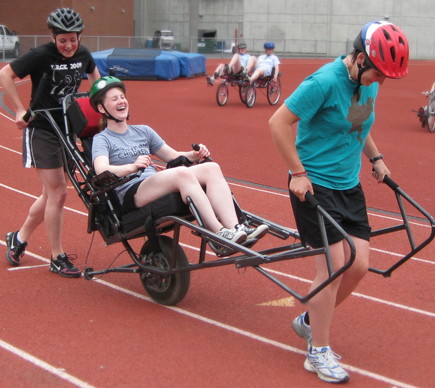
Adapted Sports Clinic
Theory, knowledge: Social and Medical Models of Disabilities
- Overview of physical disabilities
- Rules of adapted sports: wheelchair basketball, amputee soccer, goal ball, adapted cycling
- Information on adapted sports organizations
Skill development: Adapted sport skills, adapted sport instructional strategies
Opportunity for authentic/natural exchange: Shared participation in activities with athletes who play adapted sports, discussion with professionals from adapted sports organizations.
Reflection: Athletes discuss the role of sports in their lives: question and answer period
- Debriefing in class in small and large groups.
Student Reflection: I gained incredible insight into my own deep-rooted fears, a strong sense of the power of compassion and inclusion, and how simple things like time, adaptations, and attitudes and expectations can easily create an inclusive environment.
Leisure and Aging (Recr 385)
Partnership Project: Students are partnered with an older adult who they meet with on a weekly basis to talk about topics being discussed in class and to explore the role of leisure over the course of their lives. Students complete a project for their partner representing something that they learned from them or about them. Students are required to do an analysis paper connecting readings and class discussions with their partnership experience.
Theory, knowledge: Theories on aging including Activity Theory, Continuity Theory, Disengagement Theory, Modernization Theory
Skill development: Interviewing skills, project development.
Opportunity for authentic/natural exchange:
- Senior partners come to campus to share opening class
- Weekly, individual meetings with senior partners
- Closing gathering in the community includes discussion and presentations/recognitions
Reflection: Students and their senior partners reflect and evaluate the quarter at closing gathering.
- Projects as gift to senior partners reflect what they have learned.
- Analysis paper integrating readings, lecture, film, and discussion with partnership experience.
Student Reflection: The opportunities which old age holds for us are often neglected or ignored. Why do so many people accept the notion that aging is full of negativity? Stereotypes may help the young individual to mask their fears by categorizing the old individual and their characteristics as completely separate from their own identity and future.
Ecotourism: Principles and Practices (Recr 479)
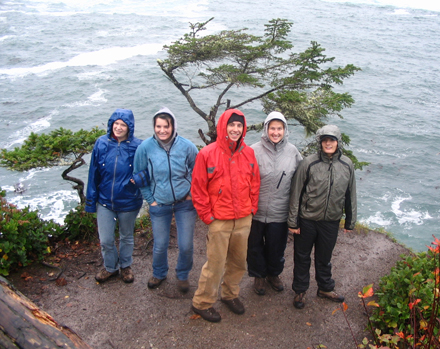
Neah Bay field trip, 2005
Neah Bay Fieldtrip: On a three-day fieldtrip to the Makah Nation students study tourism and the sense of place that tourism threatens to erode. They meet with tribe tourism staff and help to develop ideas for sustainable tourism. They share meals and conversation with tribal elders, are taught activities like canoeing and cedar basket weaving by community members, and sit in discussion over current issues like whaling. Students are mentored in community-based tour guiding and tour leadership through the involvement of a guide from Crooked Trails, a nonprofit, community-based tourism organization in Seattle who co-leads the trip.
Theory, knowledge: Community-based Tourism, Cultural Tourism, Ecotourism, Geotourism, Indigenous Tourism. Destination Life Cycle and models for sustainable tourism development.
Skill development: Community tourism planning, tour guiding
Opportunity for authentic/natural exchange:
- Shared meal with tribal elders
- Discussion with members of whaling expedition
- Bone Game with Makah families
- Discussion with museum director and tribal tourism planners
- Instruction by community members in cedar basket weaving, canoeing, etc.
Reflection: Each student writes an article directed toward Neah Bay Newsletter about his or her experience.
- Debrief in class following the trip
Student Reflection: I remember our dinners with tribal members and meeting their families who shared in the experience. I felt a sense of privy to be witness to family songs that have carried on for generations, to take part in the Bone Game that filled our cabin with the sound of beating drums and laughter. These were times of pure humbling joy. The kind of joy that makes you witness to something much greater than yourself, a connection with people you have never experienced. I thank the Makah Tribe for allowing us to experience their unique way of life ... that created a sense of understanding and kinship.
Neah Bay field trip, 2005
Conclusion
Jill Heckathorn helps her students welcome the campers
I am privileged to have the support of the Recreation Program in making these class experiences possible. The cohort model allows me to more easily schedule the blocks of time required for these activities. The help and support of faculty and staff in the Recreation Program are essential to their success. I couldn't do what I do in the way that I do it without the clear engagement and appreciation of students in the Recreation Program.
"And most importantly, I learned that I need to be the one who is actively pursuing an inclusive world. I can't just expect someone else to make the change happen; if I want something done, I need to be the one to do it. I want to see the happiness on the faces of those community members on every single face in this world. We need that; we deserve that." (Recreation Major 2011)
Footnotes
1 Rud, A.G. and Garrison, Jim, The Reverent Educator: The Call to Supporting Students' Spiritually on our Campuses, Spirituality in Higher Education Newsletter, May 2009, Volume 5, Issue 2, page 2.
2 Woodruff, Paul, Reverence: Renewing a Forgotten Virtue, New York: Oxford University Press, 2001, page 63.
3 Kolb, D., Experiential Learning: Experience as the Source of Learning and Development, Prentice Hall, 1983.

